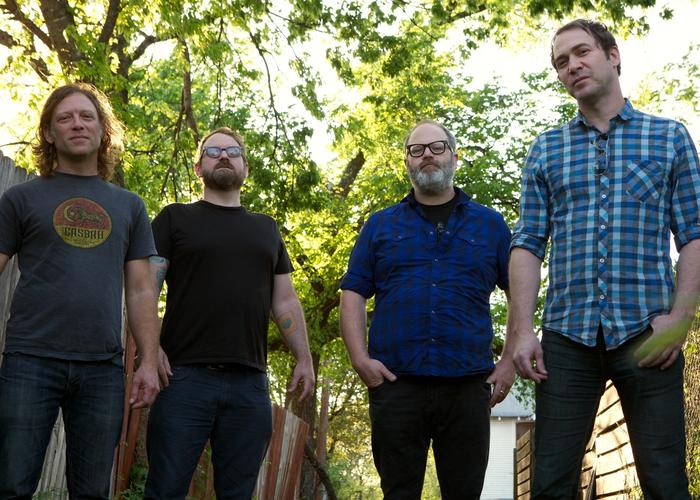Austin-based rock & roll foursome Moonlight Towers earned a distinction in 2011 that few can claim when revered musician-actor-legend Little Steven Van Zandt named the band’s tune "Heat Lightning" one of the “coolest songs in the world.”
Back at home that year, local paper the Austin Chronicle concurred, saying “Simply put, there’s not a hair out of place,” and describing the band’s music as, “Rock-solid bar room pop salvation songs that bypass the moment in favor of something that will never go completely out of style.”
While they enjoyed the big praise, the band had something different in mind at the start.
“We just want to make people dance,” is how Moonlight Towers lead singer, songwriter and guitarist James Stevens summarized their mission at the time of the release of Day Is The New Night in 2011.
Now Moonlight Towers returns with a new record that Stevens says will “not totally overwhelm the listener ...
Show the rest
Austin-based rock & roll foursome Moonlight Towers earned a distinction in 2011 that few can claim when revered musician-actor-legend Little Steven Van Zandt named the band’s tune "Heat Lightning" one of the “coolest songs in the world.”
Back at home that year, local paper the Austin Chronicle concurred, saying “Simply put, there’s not a hair out of place,” and describing the band’s music as, “Rock-solid bar room pop salvation songs that bypass the moment in favor of something that will never go completely out of style.”
While they enjoyed the big praise, the band had something different in mind at the start.
“We just want to make people dance,” is how Moonlight Towers lead singer, songwriter and guitarist James Stevens summarized their mission at the time of the release of Day Is The New Night in 2011.
Now Moonlight Towers returns with a new record that Stevens says will “not totally overwhelm the listener with heavy ‘me, me, me’ deep thought,” a claim that sounds like another version of “We just want to make people dance.”
So, he’s saying that this album isn’t heavy? OK, fine.
But, the upcoming Heartbeat Overdrive (November 11th, Chicken Ranch Records) is, as its title suggests, passionate and strong. So much so that “recommended if you like Springsteen, Petty, and 70’s-era Dylan” is kind of putting it mildly.
“It’s basically a play on the physical feeling of one’s heart racing,” Stevens explains of the theme. “The feeling brought on by not knowing what the future holds. It’s also about the hope that gets us out of bed.” This last bit is best heard on the album’s first single “Out of The Gray”.
“It was written to chronicle that shitty feeling of watching someone you love go away forever, yet doing your best to pick it all up,” Stevens explains.
Like the American songwriters we can relate to most, Stevens taps into the realities of what he knows, and what he sees going on around him, for inspiration. Those realities are often difficult to look at, but can bring about music that is incredibly personal and universal at the same time. One example on Heartbeat Overdrive is the song “Come Back To Tara,” which was inspired by Stevens’ sister and father, the latter of which provided the actual words that make up the song’s catchy chorus.
“My sister was going through an awful divorce, was feeling betrayed and had been through the wringer,” Stevens explains. “My old man was a ‘Gone With The Wind’ fanatic, and he said that she just needed to ‘come back to Tara’, which is what he jokingly called our childhood home. I was looking for a chorus, so I ripped that off. My sister found happiness in the end.”
The memory of Stevens’ late father had an effect on the entire album, in fact.
“These new songs began to arrive as we were getting ready to tour on Day Is The New Night,” Stevens says. “Although he passed away right before the release, he was really excited for the album to come out. It was actually the first time I’d seen him show interest in what I was doing musically.” Further along is “Fool’s Highway,” which Stevens calls “a fun little ditty I wrote after my wife moved out.” He describes living in “an abandoned castle, reduced to a place to pile my dirty laundry. But, I’m not the only one, right?” he says, providing the fork in the road that leads away from the idea that he could be mired. “I give it a little optimism at the end.”
Other tunes weave in stories of seeing loved ones deal with loss (“Windowpane,” written in London while Stevens was on tour playing guitar with Craig Finn’s band), the monotony of spinning wheels (“Day In Day Out”), romantic affairs (i.e.: cheating in “Wrong Enough To Be Right”), and the title track “Heartbeat Overdrive” about being just scared enough of relationships to think that it’s easier to stay lonely.
With all of this “not heaviness,” one might think Stevens is perhaps putting on a brave face rather than be thought of as a purveyor of sadness when he says Heartbeat Overdrive isn’t a heavy album. But, to his credit, when you get to the grooves themselves, this album is a real jam.
Stevens speaks to that, saying that the goal in the studio was to “capture as much live energy off the floor as possible.” And they did, because for as much as these songs are actually “heavy” (let’s just say it, OK?!), none of this heavy shit has seemed to have actually gotten anyone down. The tunes sound alive, played by guys who are living, and more importantly, guys who are living through it.
“I think we thrived on that energy,” Stevens says. “It was an emotional roller coaster, but I just wanted to get the rawest performances I could.”
The conclusion: Heavy is cool. Even Little Steven thinks so.
Hide the rest















